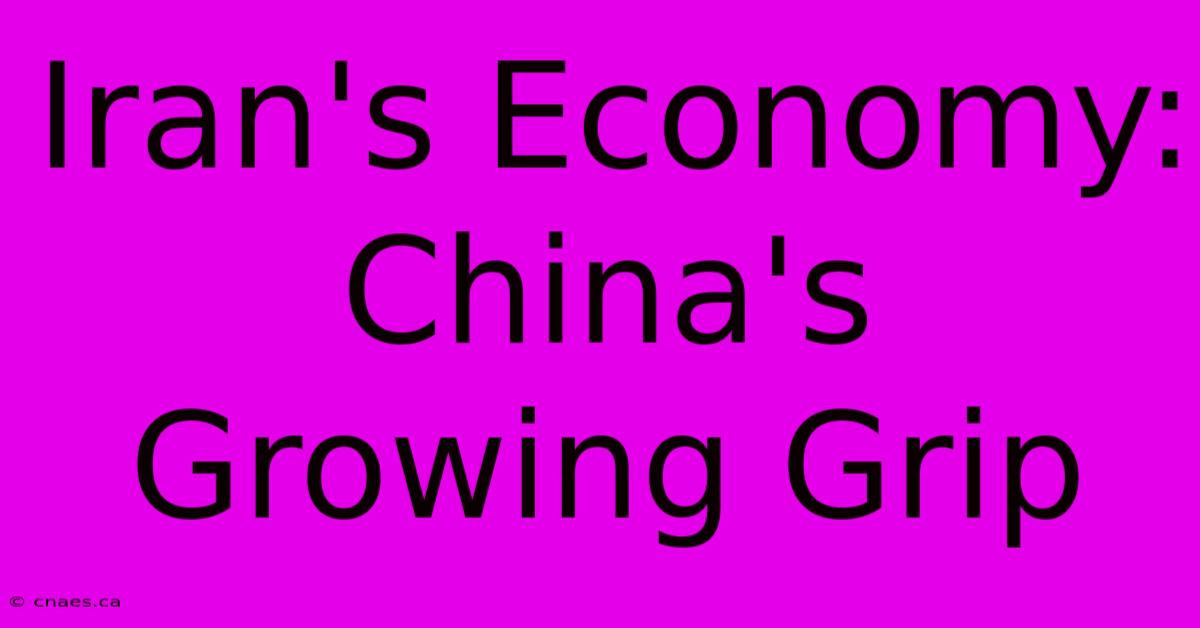Iran's Economy: China's Growing Grip

Discover more detailed and exciting information on our website. Click the link below to start your adventure: Visit My Website. Don't miss out!
Table of Contents
Iran's Economy: China's Growing Grip
Iran's economy is, to put it mildly, a mess. Years of sanctions, internal mismanagement, and fluctuating oil prices have left it gasping for air. Enter China, a seemingly unlikely savior, but one whose growing influence raises serious questions about Iran's economic sovereignty. This isn't just about trade; it's about who really calls the shots.
The Sanctions Squeeze and China's Opportunity
For years, international sanctions hammered Iran's economy. These sanctions, primarily led by the US, targeted its oil exports – a major source of revenue. This created a massive hole in the Iranian budget. This is where China stepped in, offering a lifeline – albeit one with strings attached.
China, already a major trading partner, saw an opportunity. With Iran needing cash and access to global markets, China was in a prime position to expand its influence. This wasn't purely altruistic, of course. China needed Iranian oil and resources, and Iran needed China's market and investment. It's a classic case of mutual need, with a power imbalance decidedly favoring China.
The 25-Year Deal: A Game Changer?
The 2021 25-year cooperation agreement between Iran and China is the biggest deal yet. It's a massive, sprawling plan encompassing everything from energy and infrastructure to technology and even military cooperation. The specifics remain somewhat opaque, shrouded in secrecy – which itself is kinda suspicious, right? But the broad strokes paint a picture of increasing Chinese dominance.
This agreement isn't just about trade; it's about integrating Iran's economy more deeply into China's. Think massive infrastructure projects funded and built by Chinese companies, creating jobs, but also potentially locking Iran into Chinese technology and standards. It feels like Iran is slowly becoming economically dependent on its giant neighbour. We're talking about a potential loss of control over crucial aspects of their own economy.
Infrastructure Projects: A Double-Edged Sword
China's investment in Iranian infrastructure projects is a major part of the deal. New ports, railways, and energy projects are promised – all potentially boosting Iran's economy. However, these projects often utilize Chinese labor and technology, potentially hindering the development of local industries. It's a classic "helping hand" that comes with strings attached.
The frustration is palpable. Iran needs the investment, but at what cost? The long-term consequences of this dependence remain to be seen. Are they trading short-term economic gains for long-term economic independence?
The Geopolitical Implications
The growing Chinese influence in Iran has significant geopolitical implications. It shifts the balance of power in the region, potentially reducing US influence and increasing China's strategic footprint. This has naturally caused major concern in the West.
Iran's dependence on China also raises questions about its ability to pursue independent foreign policy. Will it be able to make decisions that are not in China's best interest? This is a key concern for those who believe in Iran's right to self-determination. It's a delicate situation, with potentially far-reaching repercussions.
The Future: A Balancing Act?
The future of Iran's economy is inextricably linked to its relationship with China. Whether this relationship will ultimately benefit Iran or further entrench its dependence remains to be seen. It’s a complex game, and frankly, the whole situation feels kinda precarious. The real challenge for Iran is striking a balance: securing much-needed investment while preserving its own economic and political sovereignty. That’s a tough gig, even for the best negotiators.

Thank you for visiting our website wich cover about Iran's Economy: China's Growing Grip. We hope the information provided has been useful to you. Feel free to contact us if you have any questions or need further assistance. See you next time and dont miss to bookmark.
Also read the following articles
| Article Title | Date |
|---|---|
| Ronaldo Among Indonesias Asean Six | Dec 01, 2024 |
| Dortmund Faces Unbeaten Bayern | Dec 01, 2024 |
| Garuda Recalls 6 Overseas Players For Aff 2024 | Dec 01, 2024 |
| Two Month Salary Bonus For Perak Staff | Dec 01, 2024 |
| Sevens Fiji Claims First Victory | Dec 01, 2024 |
